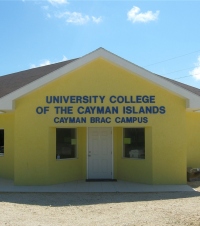Archive for June 17th, 2011

Robbers held gun to victim’s head
 (CNS): A man was robbed of cash outside his home in George Town early this morning as a gun was held to his head. Police said that on Friday, 17 June, at approximately 5:55am a man leaving his home on Crewe Road GT was accosted as he walked towards his vehicle by three men, one of whom had a black square handgun and the other two had machetes, the suspect with the gun held the gun to the victim’s head and demanded cash from him. The victim handed over substantial amounts of cash to them. They also took his cell phone and other items of property.
(CNS): A man was robbed of cash outside his home in George Town early this morning as a gun was held to his head. Police said that on Friday, 17 June, at approximately 5:55am a man leaving his home on Crewe Road GT was accosted as he walked towards his vehicle by three men, one of whom had a black square handgun and the other two had machetes, the suspect with the gun held the gun to the victim’s head and demanded cash from him. The victim handed over substantial amounts of cash to them. They also took his cell phone and other items of property.
The suspects are described as follows: the suspect with the gun is described as approximately 6ft 2inches tall, they were all dressed in black clothing, all wearing gloves and mask covering their faces, with only their eyes visible.
Police responded to the scene and surrounding areas where an extensive search was carried out. No shots were fired; victim sustained no injuries during the incident
Should anyone seen anything suspicious this morning, or have any information relative to this incident, they are asked to call the GTPS 949-4222 or Crime Stoppers at 1800 (TIPS).

Marine science course to be offered on the Brac
 (CNS): The UCCI Cayman Brac campus faculty is looking into offering a marine science course and hopes that, when launched, the course will not only attract local students but international students as well. However, Campus Director Martin Keeley noted that before that could happen, a science lab would have to be created, something which the campus currently lacks. He noted that the campus would need $50,000 in funds to make this a reality, for which they are seeking donations from corporations and individuals. While Keeley said details about the course are still under discussion, it is tentatively scheduled to start in January 2012 and would span two semesters.
(CNS): The UCCI Cayman Brac campus faculty is looking into offering a marine science course and hopes that, when launched, the course will not only attract local students but international students as well. However, Campus Director Martin Keeley noted that before that could happen, a science lab would have to be created, something which the campus currently lacks. He noted that the campus would need $50,000 in funds to make this a reality, for which they are seeking donations from corporations and individuals. While Keeley said details about the course are still under discussion, it is tentatively scheduled to start in January 2012 and would span two semesters.
A long time member of the National Marine Educators Association (NMEA), Keeley heads the association's Caribbean chapter and noted that while the campus attracts great local students, it is a goal for the Brac UCCI to attract both international students and professors that would not normally come to the island to study and work. He said that he, a trained marine science teacher, could assist inteaching the course, but the course would require international professors to teach it alongside him.
International students who came to the Brac for the course would stay in short term rental accommodation and rent cars, and may well also dive with local diver operators, thus helping the Brac economy, Keeley said.
The NMEA member also said that the campus, which offers courses for UCCI students on the Brac, Civil Service College students as well as continuing education courses, has recently received valuable donations in the form of four new state-of-the-art computers from local law firm Maples & Calder and new books from a Canadian professor (who wishes to remain anonymous).
The college has paid for video-link technology between the Brac and Grand Cayman UCCI campuses, which has been set up in two of the Brac classrooms and allows students and professors at both campuses to communicate with each other. Keeley admitted that some students had issues with video-link classes, noting that its effective use required the student to take more responsibility for their learning in the classroom.
According to Brac UCCI figures, there are about 130 students enrolled at the campus. On average for each academic year, 40 students study in the Brac UCCI's associate degree programme, 6 in certificationteacher training programmes and legal studies programmes, 25 in the Civil Service College and 60 in continuing education courses.
Keeley said that in 2010, there were 5 graduates from the teacher training programme and 3 graduates from the legal studies programme and that, if all student pass, 2011 will see two graduates from the teacher training programme, 3 graduates from the legal studies programme, and 4 graduates from the associate degree programme. Keeley did note that around 7 or 8 students transferred from the Cayman Brac UCCI to the Grand Cayman UCCI within the last year.
Keeley, who has been Campus Director since the Brac UCCI's January 2008 opening, said that the campus enjoyed a strong start until Hurricane Paloma, a major stumbling block, which led to some students dropping out and two classrooms having to be shared with the RCIPS, limiting classroom space. However, he assured CNS that the campus was now running better than ever, especially after the Brac UCCI's move from Stake Bay to West End last year, which saved the campus a considerable amount of money in rent.
He stressed that there was great potential for the campus. The faculty is exploring the possibility of expanding its offerings to include certification courses in plumbing, construction and urban planning, which he believed would benefit both Brac school leavers and more mature students.
He also said that it was a goal of the Brac UCCI to not only attract international students and professors, but also to encourage students who dropped out of their courses after Hurricane Paloma to enroll again.
Joshua Dilbert is a Year 11 student at the Layman E. Scott Sr. High School who is working with CNS as part of the school's Worklink programme.

Mac signs oil refinery MOU
 (CNS): Full story –– The premier has revealed that he has entered into another 'Ministerial MOU', this time with two firms who plan to develop an oil refinery on Grand Cayman. McKeeva Bush said the deal was merely to allow talks and research to begin between the ministry and the developers, Ventech Ltd and a local company Navitas Ltd. The proposal will see crude oil being imported to the island and then turned into products such as diesel, propane, aviation fuel and gas for cars, at what is being described as a modern refinery, which those proposing the project say will remove emissions and toxins. The proposal will double the amount of crude oil coming to the island compared to current levels of diesel.
(CNS): Full story –– The premier has revealed that he has entered into another 'Ministerial MOU', this time with two firms who plan to develop an oil refinery on Grand Cayman. McKeeva Bush said the deal was merely to allow talks and research to begin between the ministry and the developers, Ventech Ltd and a local company Navitas Ltd. The proposal will see crude oil being imported to the island and then turned into products such as diesel, propane, aviation fuel and gas for cars, at what is being described as a modern refinery, which those proposing the project say will remove emissions and toxins. The proposal will double the amount of crude oil coming to the island compared to current levels of diesel.
Speaking in the Legislative Assembly on Friday morning, the premier said the proposal, if it were to go ahead, would bring significant benefits aside from cheap fuel costs, such as jobs, revenue for government and reduce government's dependency on imported oil. Announcing his intentions to talk with the companies who are proposing the development, he said the 'Ministerial MOU' opened the door just for talks and further research by the ministry's technical team.
At present the islands consume around 3,400 barrels of refined oil products but if the refinery was to be given the green light it would produce around 6,000, with the additional product being exported, creating a new revenue stream, the premier stated. This would mean that while the duty taken for government would be less on the future imported cheaer crude oil the increase in the number of barrels would see government collect even more revnue than at present as the developers are not asking for any waivers or duty concessions.
Bush listed what he believed would be a catalogue of benefits with the introduction of the plant including the immediate reduction of the fuel surcharge on CUC monthly bills and a reduction in the cost of gas at the fuel pumps.
“By installing a refinery here on the Islands, we are in command of our destiny and can participate in setting the ultimate cost of refined products such as Diesel (CUC), Gasoline and LPG,” the premier told his legislative colleagues. “This plant will allow every citizen to realize reduced energy costs that will immediately better your quality of life and reduce the cost of living.”
He also said that the royalties collected would be placed in a sovereign fund which would be shared directly with the public through annual dividends or funding green energy projects.
Bush said the firm had already commenced a full environmental impact assessment to analyze all the potential issues related to the development. He said the firms would be “utilizing modern technology that is very safe and doesn’t employ the use of the refining technology of the past, which generated major pollutants.”
Mario Rankine, one of the local people involved in the proposal, said that the technology behind the 'emissions free' refinery has also been offered to CUC to reduce the emissions on their towers. He stated that the refinery will use state-of-the-art technology to clean the emissions from the plant to the point where they can be diverted for use in greenhouses to grow vegetables.
So far, however, the technology which the developers propose to use at the refinery to clean up the toxins and poisonous by-products has only been used at power generating plants and has not yet been used at any oil refineries.
Although the developers claim the project is environmentally sound, there are concerns over the transportation of the filters which will be used to clean the toxins from the refinery process, which will have to be shipped overseas.
In addition, the question of how importing almost double the oil currently consumed on island will help government achieve its goal to reduce the use of fossil fuels and encourage more sustainable forms of energy has not yet been answered.
See the premier's statement below.

Next step independence
"Those who ignore history are doomed to repeat it.” Even our recent recallable past counts as history. Here’s a quick refresher. Back in McKeeva’s first term (before the word Premier was introduced) CIG was suffering a severe financial crisis, so much so that the police force was trimmed back considerably and it was announced by Mr Bush that he did not know where the money was going to come from to meet the next Civil Service payroll.
CIG was on the verge of shutting down for lack of money. People were scared and concerned. This financial catastrophe was the talk of the day. Then suddenly, out of the blue, huge roads projects began happening. Roundabouts were springing up everywhere almost overnight. It was even joked that Cayman would soon look like lots of bulls-eyes on a dart board (no pun intended) from outerspace due to all of the roundabouts. No one explained where the sudden windfall of money came from. CS got their paychecks and everything seemed normal except for the obvious and extravagant spending on public infrastructure projects by CIG.
The source of the funds and the amount supplied to CIG is know by a few insiders but has never been publicly disclosed. Neither has the terms (if any) of repayment or compensation for the money. We will probably never know.
Now CIG has “partnered” with Dart, a private company in order to save the day and our future. Most people are happy and feel fortunate to have such a generous person living here and supporting our economy. A deeper look at the deal raises questions. This partnering has been in the works for some time. Many issues were placed before us as distractions while all of this was going on. The Premier announced often that he was traveling the globe to bring investment here, all the while knowing that he had closed this partnering deal with Dart and did not have the honesty to announce it beforehand. Yes, politics as usual.
This partnering plan calls for a billion dollars to be invested over 20 years. Since our GDP is about $1 billion per year, this amounts to about a 5% contribution to our economy per year or 50 million dollars per year. On top of this CIG is granting Dart a duty waiver of 45 million dollars. With the current rate of duty at 22%, this waiver represents 205 million dollars worth of imported goods. Dart has businesses that are in direct competition with local businesses. Do we know that he won’t use this duty exemption as an advantage to be able to sell his goods for less and destroy the competition? This playing field is tilted in Darts’ favour and is in contradiction of free market economics. As our partner, what is to keep Dart from dredging the North Sound to suit his needs? After all, he bought the right to do what is best for all of us. The deal so far has not been transparent, so why would we trust or expect transparency going forward?
It was declared by Deloitte in their Economic Impact Study performed for Joe Imparato on the EE Seaport that for every 1 million dollars invested here a single job is created. Using this as a yard stick, Darts’ 50 million per year contribution will create 50 jobs per year. Not all of these jobs will be filled by Caymanians. It will fall far short of putting a dent in our 6.7% unemployment rate.
As a partner in our lives, I would think it should be required by law that Mr Dart be forced to disclose his personal and corporate finances publicly for the last 15 years. Our own CIG is attempting to throw its past accounts out the window. Why do accounting at all if you are not going to be accountable? CIG should be forced to reveal the past accounts, no matter how badly they were kept and no matter what the results show. Let the public see the numbers. We have the right since its our money after all. The only reasonable explanation for not disclosing them is the political and possible legal backlash that would take place. Showing the accounts could shed a bad light on those in charge but not showing them sheds the worst light possible because it leaves us in the dark. Perhaps the powers that be are afraid of looking like they are not capable of performing their duties or worse. Either way, the confidence in this government is gone and cannot be regained.
The big question now is whether the UK will want us as a territory with our new found partner in Mr Dart. I don’t believe this is standard practice among British territories. Without full public financial disclosure, the UK is taking on a partner they know little about. They could be opening themselves up for unforeseen liabilities, as can we. This may just be a “backdoor” way of ushering in independence from UK by having them get rid of us rather than us leaving them. It sure seems that the Premier’s actions are leading up to this.
A really good politician is able the stick a knife in your back while making you think he just gave you a gift.

Economy contracts 11%
 (CNS): Despite the government’s claims on improving government finances and its continued finger pointing at the opposition for the country’s economic woes, two years into office the opposition leader pointed out that Cayman’s economy has contracted by eleven percent under the UDP watch. In his response to the premier’s budget address, Alden McLaughlin said there was very little in it to offer hope to local businesses and the unemployed. The PPM leader asked McKeeva Bush how government was assisting the people and where in his budget plan would the lives and fortunes of the people be improved.
(CNS): Despite the government’s claims on improving government finances and its continued finger pointing at the opposition for the country’s economic woes, two years into office the opposition leader pointed out that Cayman’s economy has contracted by eleven percent under the UDP watch. In his response to the premier’s budget address, Alden McLaughlin said there was very little in it to offer hope to local businesses and the unemployed. The PPM leader asked McKeeva Bush how government was assisting the people and where in his budget plan would the lives and fortunes of the people be improved.
The leader of the opposition focused heavily on government’s failure to do anything about the very high cost of living and cost of doing business in Cayman. He said it was the fiscal policies pursued by the government over the last two years which have made the hard times brought on by the global recession harder.
“They have had the effect of increasing the cost of living, of reducing the amount of money in circulation, of discouraging investment, of reducing employment opportunities and of shrinking the economy,” he said. Since Bush's administration has been in office, the Cayman Islands” economy has contracted by around 11%, McLaughlin said, adding, “He should be frightened by that.”
McLaughlin noted that in the three budgets the UDP administration has delivered (there is now only one more before the next election) it has increased the tax burden on the people and businesses. Although in this budget the one fee increase is only on certain hedge funds, the PPM leader pointed out that it still added to the national tax burden and was another cost for the financial services sector to absorb.
He pointed to the fees and taxes imposed in the previous budgets as having “a truly crippling effect” because of their impact on everyone. McLaughlin accused the UDP of putting pressure on local businesses very early in its term with its attempt to balance its first budget after the elections by imposing a raft of additional taxation. Despite the pain, the promised $9 million surplus never materialized and the government wound up incurring a deficit of $15m while the fees drove up the cost of doing business. Again in 2010 government imposed more taxes, fees and duties, the impact of which, he said, has been significant and in some cases devastating.
He reminded the House that the UDP had never missed an opportunity to talk about the need to nurture and support small business when in opposition and during the election campaign but once in the driver’s seat their concerns fell away as they increased fees and taxes with no consideration to the impact on small businesses.
“It would appear from the focus, or perhaps more accurately the obsession, of the premier with big business that really small business doesn’t matter to this government,” he added. “Since the start of this administration there has been one grand announcement after another by the premier of some major private sector project or the other which is touted as the answer to all our economic woes.”
Some of these projects have “truly verged on lunacy”, McLaughlin stated, pointing to the proposal to dredge a channel through the reef and create man made islands in the North Sound, but thanks to the opposition to this “environmentally deadly” project, the government had withdrawn its support. He offered his congratulations and gratitude to Captain Bryan Ebanks and the “Save Cayman” team for the campaign which, he said, had convinced the government not to allow the project to proceed.
He pointed to the growing controversy around the East End Sea Port or ‘mega quarry’, which proposes to rip a 600 hundred foot gash in the southern coastline of East End and then dredge 60 feet deep for a ¼ of a mile inland. “It will divert the current scenic road inland for a mile. It will undercut the largest, freshest and most important water lens in the Cayman Islands and risk turning it saline over time,” he said, and noted some of the alarming issues associated with this development. “Yet it appears to continue to have the support of the government,” he added as he pointed to comments made by Bush.
“That the government could support and encourage these two potentially environmentally disastrous projects as part of its economic development policy is, quite frankly, scary,” McLaughlin said and pointed to the premier’s claims of being committed to robustly defending the environment. “It’s just as well that the government is so committed to the environment. I can’t imagine what would happen or what they would permit to be done in Cayman if they were not so environmentally conscious and committed,” he said.
He pointed to the concessions being offered to entice big investors and said he would speak at another time about the latest Dart-government deal which hadbeen announced only hours before his presentation.
McLaughlin said concessions were important in encouraging investment when it is desirable, but the consistent demand of potential investors for reduction in duties and the relaxation of immigration regulations should be telling the government something. Although the premier is boasting about being investor-friendly, McLaughlin said he appeared to be so only in relation to rich foreign investors.
“It is the big foreign investors who get all the breaks — on work permit fees, on planning fees, on import duties — and it is the foreign investor who gets guaranteed work permits and other exemptions. The government doesn’t seem to bat an eye in handing out concessions to big, foreign operations. On the other hand local businesses, or even foreign businesses which are established here, not only do not get concessions but over the course of the last couple of years have been targeted by the UDP government and required to pay higher and higher fees and taxes,” he added.
He asked why government does not give the local businessman a break with fees.
“Does the government take them for granted and believe they don’t contribute enough to the local economy to be worthy of a concession during these hard times, even if only temporarily?” he asked.
Despite government rhetoric, he said, it was ironic that in the two years the UDP has been in office not one major development has begun and it is existing business that keeps the economy moving at all. “I call on the premier and his government again, as we in the opposition have done for the past two years, to roll back the increases in fees and taxes which they have imposed since they took office.”
Welcoming the reduction to fuel bills after government had increased the cost of diesel to CUC by 45 cents a gallon, whatever the rebate would be it will provide some break in the cost of electricity. But he called for a roll back of the additional 25 cents duty on fuel which government introduced last year to reduce the cost at the pump as well.
With the government still repeatedly blaming everything on the PPM, against the backdrop of an improving global economy, the government had missed an opportunity to improve people’s lives. “This budget offers no hope of any immediate reversal of our fortunes. It was uninspiring, unconvincing, unfulfilling. In short … it was unacceptable,” the opposition leader said, adding that government needed to return to the drawing board.

Song will raise funds for Cayman conservation
 (CNS): A young musician says he intended to release a song to the public encouraging them to support ongoing efforts to preserve the natural resources of the Cayman Islands. Brett McTaggart told CNS he was concerned about the negative effects the recently proposed projects announced by government would have on the country, particularly the East End Sea Port. The song will be available on 30 June on iTunes for $1.29. It is to be promoted via his website and facebook.com, and a sum of the profits from the song's release will be given to a local charity supporting environmental preservation efforts.
(CNS): A young musician says he intended to release a song to the public encouraging them to support ongoing efforts to preserve the natural resources of the Cayman Islands. Brett McTaggart told CNS he was concerned about the negative effects the recently proposed projects announced by government would have on the country, particularly the East End Sea Port. The song will be available on 30 June on iTunes for $1.29. It is to be promoted via his website and facebook.com, and a sum of the profits from the song's release will be given to a local charity supporting environmental preservation efforts.
A music video to accompany the song, which lasts nearly 5-minutes, shows various scenes around Grand Cayman and features voiceovers of local news readers talking about the various ongoing development projects and escalating crime. The song and video is part of McTaggart's movement for change with its message about opening people's eyes to Cayman's natural beauty and doing all they can to discourage rising crime within the country.
The former student of Cayman Prep & High School said that he felt government was trying to overdevelop Cayman and that they should be more focused on preserving the country's natural resources.
"It's like the government is trying to turn Cayman into an industrial place, which is not what Cayman is all about", said the 22-year-old.
McTaggart, who graduated from Winter Park, Florida's Full Sail University, with a bachelor’s degree in Recording Arts last year, is currently living on Grand Cayman and also expressed concern about the county's rising crime levels.
"Don't resort to violence and robberies", the 22-year-old tells the Cayman public."There's got to be other ways for people in Cayman to get by. Get to know people better and be more proactive."
See Brett McTaggart's website here
Joshua Dilbert is a Year 11 student at the Layman E. Scott Sr. High School who is working with CNS as part of the school's Worklink programme.

By-pass heads for West Bay
 (CNS): As part of the new mega-deal with government and the Dart Group of companies the local development company will be closing a stretch of Seven Mile Beach and in return taking the Easterly Tibbetts highway into the heart of West Bay. The new road, which is already under construction, although government and Dart have not yet signed the mega-deal paperwork, will be extended from Raleigh Quay where it currently ends to Batabano in the district of West Bay. In return a 2,500 ft stretch of the West Bay Road between the RSB Coutts office and the Yacht Club drive will be closed in order to facilitate a new beach front four star resort on the land, which includes the former Courtyard Marriot.
(CNS): As part of the new mega-deal with government and the Dart Group of companies the local development company will be closing a stretch of Seven Mile Beach and in return taking the Easterly Tibbetts highway into the heart of West Bay. The new road, which is already under construction, although government and Dart have not yet signed the mega-deal paperwork, will be extended from Raleigh Quay where it currently ends to Batabano in the district of West Bay. In return a 2,500 ft stretch of the West Bay Road between the RSB Coutts office and the Yacht Club drive will be closed in order to facilitate a new beach front four star resort on the land, which includes the former Courtyard Marriot.
As part of the development of the four star resort, Dart has also committed to extending the current Seven Mile public beach area and add a second public beach location to the north of the new resort. The moving of the road will enhance the value of the property significantly but government has said that the quid pro quo elements of the deal it has struck with the country’s largest land owner and investor will bring significant benefits to the local economy and wider community.
Speaking on behalf of Dart Realty Cayman Ltd on Wednesday, Jackie Doak, the COO of Dart Realty, said that the movement and closure of the road will not block access to the beach.
“We are only physically removing vehicular access to those parts that we have development plans for, which is currently the area between the previous Courtyard Marriott and public beach,” she said at the official announcement presentation with government.
She explained that Dart was motivated to approach government about a partnership to help resolve some of the infrastructure problems as a result of what she said was the worsening economic climate throughout 2009/10 as well as Dart’s own concerns about starting new phases in its own master development plan for Camana Bay.
As a result of the “unemployment, crime, downturn in tourism and the resulting growing concern of the country’s ability to tackle significant capital projects such as the landfill, schools and roads, we had internal discussions regarding our concerns about the phasing and pace of our future development,” Doak revealed.
After months of negotiations with the present government, Doak said the two parties eventually reached an agreement, which she said provided Dart with the confidence and certainty to proceed with its development plans after government had demonstrated its willingness to create a “positive and facilitating environment for proven and thoughtful development,” she added.
The complex mega deal includes a number of swaps, benefits and concessions between government and Dart, including duty waivers, which Doak said was the first Dart had received since it began investing in the country.
“The partnership also includes incentives, but it is beneficial to note that if you take just the Camana Bay Town Centre and the renovation of our two downtown buildings, direct construction costs exceeded $600m. And while this is a significant investment in the island, during that time we did not at any time asked for, or receive, any government fee reductions, abatements or incentives,” she stated.
The new agreement, Doak added, provides only development incentives which are not retroactive and they do not credit Dart’s historical development or apply to existing businesses within the Dart Group of companies. “They apply only if we continue to invest and develop in Cayman in the future,” Doak said in her presentation.
“With the Esterly Tibbetts Highway extension, realignment of West Bay Road, investment
in the hotel and expansion and enhancement of the existing public beach … and a new public beach to the north, we are building much needed Infrastructure,” she stated.
Doak said Dart planned to bring “a new and game changing hotel” which would rejuvenate the tourism industry, bringing a new level of services and amenities. “It will also provide much needed jobs in this sector, which will also see benefits for taxi drivers, watersports operators,” she added.
Dart has created a website where people can visit to log questions about the new alliance between the developer and government at www.forcayamn.com

‘BEST’ to intervene early with problem kids
 (CNS): A collection of government agencies from most of the ministries and portfolios have signed an MOU committing them to working together to help at risk kids at the earliest opportunity. Spearheaded by the education ministry the BEST (Behaviour and Educational Support Team) initiative will see social workers, councillors, teachers, health staff and myriad other professionals taking collective action to assist and support vulnerable children and their families to save them from a potential life of crime of failure. With more than 200 children in need of support the programme aims to turn things around before it’s too late.
(CNS): A collection of government agencies from most of the ministries and portfolios have signed an MOU committing them to working together to help at risk kids at the earliest opportunity. Spearheaded by the education ministry the BEST (Behaviour and Educational Support Team) initiative will see social workers, councillors, teachers, health staff and myriad other professionals taking collective action to assist and support vulnerable children and their families to save them from a potential life of crime of failure. With more than 200 children in need of support the programme aims to turn things around before it’s too late.
The goal of the project is to stop government agencies from operating in silos – ie not communicating or talking to each other – but to pool all of government’s resources to “wrap services around” to save each and every child that is identified as being at risk or vulnerable.
Speaking at the official signing of the memorandum of understanding on Thursday morning, the education minister said the initiative had already been piloted in some schools and was already changing lives for some young people. Rolston Anglin said it was a new approach to ensure all children in the Cayman Islands had the chance to succeed by involving teachers and parents with at risk students and wrapping around them with a multitude of life changing support services.
“For too long we have been saying it is only a small percentage but that percentage continues to grow and impact is very heavy on community,” he said adding that a lot of young people were at risk and the authorities needed to rescue children at earliest possible stage. The minister said it was about rescuing them from a path that would end up on the courthouse door step.
Following a trip to Finland which has one of the highest education attainment levels Anglin said the education department had discovered that 33% of students there access special support services. He explained that the success comes because of the early intervention.
Michael Myles a professional councillor who is spearheading the initiative in the ministry said that he had spent much of his 15 year career in institutions. He said by the time the youngsters reached the Bonaventure home or the Marine Institute it was too late. He said it was disheartening to see that the young people were already lost and he pointed out that many of the problem kids the education system is dealing with today are the children of those lost youngsters he was dealing with ten years ago.
“I believe if everyone unites it is going to be brilliant,” Myles said of the initiative. “The MOU is just paper but at end of day it’s going to come from the cooperation and work with we do with each other where the children will benefit.” He appealed to all the officials involved not to let the project die “We have identified over 200 kids in the system that chronically need this,” Myles added.
In the pilot project Myles said there have already been some very positive results with the extensive family intervention that has taken place which is not just counselling support but has involved re-housing families, getting employers involved to improve working hours for single mothers and getting psychiatric help. He said just providing access to services, as so many families have no idea what is out there to help them, can make a significant difference.
See details of project below